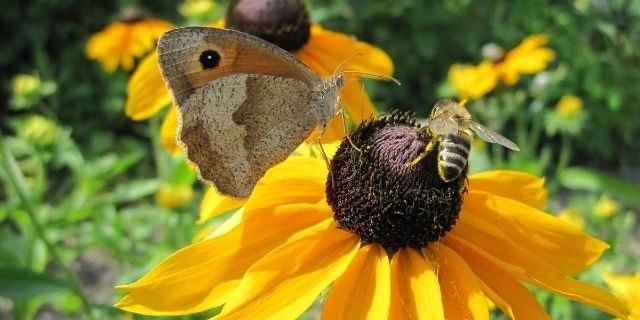26
Jan
Officials in New Jersey and New York Act to Protect Pollinators by Restricting Neonic Pesticides

(Beyond Pesticides, January 26, 2022) Officials in New Jersey and New York are taking action to protect their states’ declining pollinator populations by restricting outdoor uses of neonicotinoid (neonic) insecticides. In New York, the state Department of Environmental Conservation announced it would make these pesticides “restricted use,” and only available to state certified applicators. In New Jersey, A2070/S1016, sponsored by state Senator Bob Smith and Assemblyman Clinton Calabrese, was signed by Governor Phil Murphy last week after years of advocacy from national, state, and local pollinator and environmental groups. “The law relies on the most up-to-date science to ban the largest uses of neonics in the state,” said Lucas Roads, staff attorney at the Natural Resources Defense Council. “This is great news for not just pollinators that are poisoned by neonics, but for all the farmers who depend on insect pollination and for all New Jerseyans that value thriving ecosystems.”
A2070/S1016 provides for a targeted phase-out of outdoor uses of bee-toxic neonicotinoids, chemicals implicated not only in the decline of pollinators, but also the collapse of entire ecosystems. Beginning 12 months after passage, the bill requires state agencies classify neonicotinoids as “restricted use.” Under this designation, only certified pesticide applicators would be allowed the apply these products, effectively eliminating consumer uses. Then, in late 2023, the bill prohibits all outdoor non-agricultural neonicotinoid uses. Exemptions are limited to vet care, wood preservation, outdoor applications within one foot of a building, and invasive species. The state agriculture commissioner may also grant a time-limited exemption for use only if an applicator can show that a “valid environmental emergency exists” and that no other less harmful pesticide is available for the given emergency.
New Jersey and Maine have now passed the strongest state pollinator protection laws in the country. While now in addition to New York, Connecticut, Maryland, Vermont, and Massachusetts have generally removed consumer neonic uses from the market, the NJ and ME bills represent another step forward by eliminating most outdoor non-agricultural uses. These changes will have major implications for pollinator and ecosystem health, reducing an even greater proportion of dangerous pesticide use. A report published by the NJ Department of Environmental Protection found that out of 250 surface water samples collected, at least one neonicotinoid was detected in over half of those tested. With even minute exposures to neonic products likely to kill off wild pollinators, any future uses that can be eliminated are a net positive for wildlife.
Although progress protecting pollinators in the U.S. has been slow in comparison to actions taken in the European Union, which has banned all outdoor neonicotinoid uses, including those in agriculture, the pesticide industry has focused considerable resources on halting U.S. policies. A 2020 report, “The Playbook for Poisoning the Earth,” published in the Intercept by reporter Lee Fang details a massive public deception campaign by the pesticide industry, aimed directly at stopping state and federal action protecting pollinators from these highly hazardous insecticides. As part of this playbook, the pesticide industry has worked to cast itself not as progenitor, but as the solution to pollinators’ plight. This approach has focused on spinning the science around neonics, diverting attention to pre-existing problems in beekeeping, like disease and mites, that are in fact exacerbated by neonic use, and using industry connected farmers, beekeepers, scientists and other influencers in attempts to confuse lawmakers and the public on the true cause of pollinator declines.
As far back as 2014, Beyond Pesticides asserted that this ongoing pollinator crisis is No Longer a Big Mystery. But meaningful action has been diffuse, and only seven states to date have enacted restrictions on neonicotinoid use. At the federal level, the US Environmental Protection Agency (EPA) merely required non-committal “managed pollinator protection plans” from individual states (MP3s). These plans essentially handed off the baton to state pesticide lobby groups to address how to protect pollinators; unsurprisingly, pesticide use was not a major component of most of these plans. In fact, in 2019 the agency was cited for its failure to provide basic oversight for these state MP3s, with the EPA Office of Inspector General noting that the agency had no way to evaluate the impact of MP3s, that the agency focused too much on acute risks to pollinators, and an insufficient amount on chronic impacts. EPA’s inaction and inability to stand up to the pesticide industry means that pollinators and ecosystems continue to suffer throughout most of the U.S.
State action is urgently needed to fill in the gaps left by EPA inaction, and New Jersey and Maine represent a new high bar for neonicotinoid restrictions. But in the long term, it is critical to stop all neonicotinoid use in the U.S. and prevent the next round of pollinator toxic chemicals from becoming widespread. The Saving America’s Pollinators Act would accomplish this goal, side-stepping industry-influenced EPA and allowing a board of pollinator experts to make decisions around pesticide registrations. Ask your elected representative in Congress to support pollinators by cosponsoring Saving America’s Pollinators Act (SAPA). If they are already a cosponsor, use this occasion to thank them for their leadership on this critical issue.
All unattributed positions and opinions in this piece are those of Beyond Pesticides.
Source: NRDC press release, New York DEC press release, A2070/S1016










